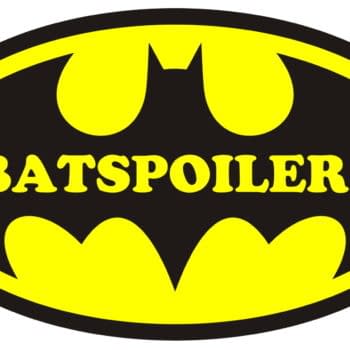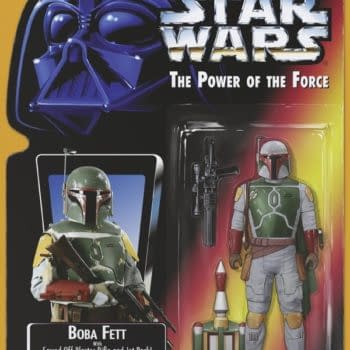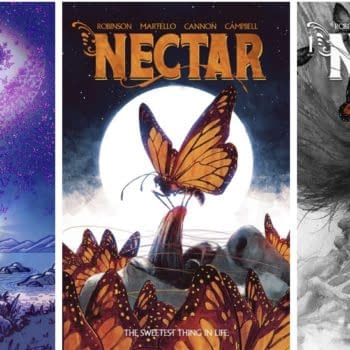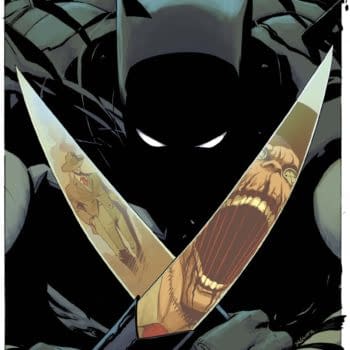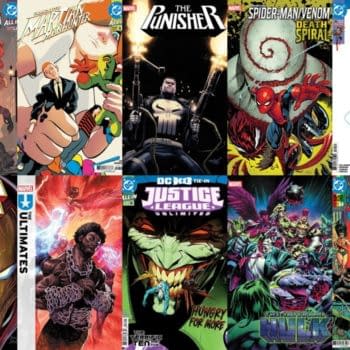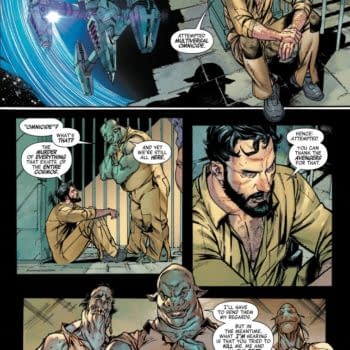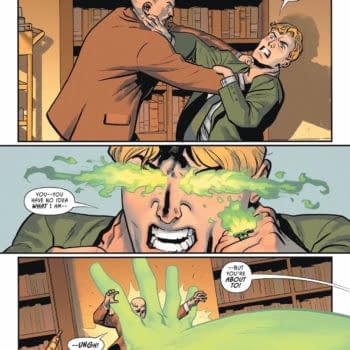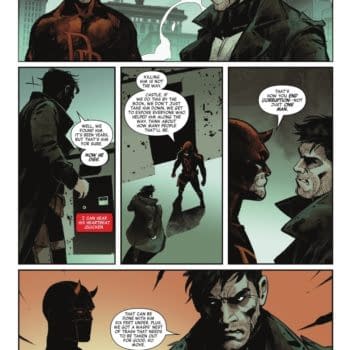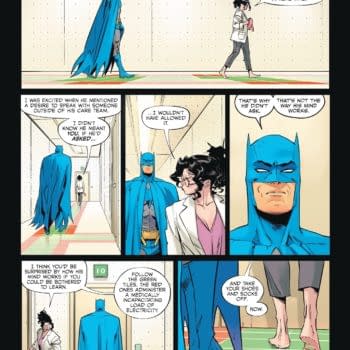Posted in: Comics | Tagged: black panel, Comics, entertainment, michael davis, michaeldavis, milestone
Buy A… Clue, Part Two: Reality Check – Michael Davis, From The Edge

If you haven't read Part One, please do that before reading this.
As mentioned last week, Bad Boy Studios, my mentor program, has produced scores of ready-for-primetime playas. The focus has always been young people of color, but the program has produced many blue-eyed soul brothers, notably two of comics' most original voices, Brett Lewis and Kevin McCarthy.
The reputation of the program keeps a steady stream of folks requesting admittance. I fund the program in its entirety, and students attend tuition-free. Let's see how many trolls overlook "students attend tuition-free" but latch on like a crack whore to some John's dick to "I fund the program in its entirely" so as to keep the "it's all about me" theme going.
The one goal of the program is to give young creators the tools to become professionals far beyond how to draw or write comic books. In real life, entrance to the graphic arts industry has less to do with talent and much, much more to do with how proficient you are outside of your talent.
In other words, the ability to meet deadlines and be trusted with greater responsibility.
I say all this, not to piss off my haters, (although that's a nice bonus) but to underscore this: what I do with the program is very hard work, costs me a grip, and takes a great deal of my time. I don't expect kids under the age of 17 or so to appreciate or grasp my direction, but I do expect them to respect my time. Most do, and I'm happy to give to them what time I can spare.
If you're a creator under 18 and you approach any established professional, remember two things above all: respect the time of the professional, and have a goal when speaking to him or her.
Again, respect the time of the professional and have a goal.
That moment you get to talk to the pro, those two things are more important than your work, your talent, and your motivation as to why you want to be an artist or writer.
For those over 18 seeking advice, respect and a goal are important. However, since you are adults, you lose the excuse of youth, giving professionals many more reasons to consider your approach intolerable. Yes, intolerable.
Simply put, you should know better. Few professionals, when asked for advice, answer with much more than "your efforts are good" or "it needs work." What I'm about to tell you is rare. This is my common-sense methodology I share with those interested because I'm in a giving mood.
Lose the attitude.
When you finally get in contact with the pro, lose any fucked-up attitude. If meeting in person, via email, or a phone call, a well-mannered presentation of one's self is critical. The amount of sheer gall some people exhibit is astounding.
Anyone asking for career advice, guidance on a project, or a critique of his or her work should behave as if all was right in the world. Regardless of if, in the haste to arrive on time, they backed over a puppy.
Immature insolence will resonate very badly with many, and as unfair as it seems, it will kill chances of would-be creators even before they present their work or idea. No one cares what you had to do endure on your career journey. Expecting any hardship to suffice as a reason to be a dick is just as stupid as broaching that subject in the first place. All you've done is tell the professional you're trouble and a little bitch to boot.
Have your work in an easily accessible format.
When meeting in person, have a black portfolio with 12-15 decent reproductions or clean original artwork. I prefer reproductions in a portfolio no bigger than 9×12, but that's me. Keep in mind that if you are meeting someone at a convention or even an office, the odds are not good there will be a lot of space for you to spread out.
Writers, have your work neatly indexed on a CD. Handing someone a written script on paper runs the very real possibility of your work being tossed.
If sending your work via the Internet, make sure you include a cover letter in the body of the email, even if you met with the person beforehand. Remind them where you met and make sure to include all your contact information. Set up the easiest way for someone to take a look at your work. If sending artwork, send as an easy to open attachment. If you send a link with a password, make sure the password works. If sending someone to your website, make sure you give them a destination tab, such as "new art" or "recent stories."
Yeah, you're all excited about having this person on your site, but 9 times out of 10 they won't go. Why? It's too much damn work, that's why. A standalone site showing your best work is best.
Less is more, and new creators would do well to remember that.
Don't present a million pieces of art, don't submit a zillion stories. Don't include sketches, thumbnails, or story ideas written on a napkin.
Simply put, what you want to avoid at all costs is wasting the time of the professional. If you fail at this, achieving your goal has little chance.
The tricky part of time wasting is most people are not aware they are doing so.
Common sense, always, bells and whistles, never
You can greatly reduce the likelihood you waste time by preparing for the meeting using common sense. Avoid any discussion or questions not focused on achieving your goal and respect the time of the professional. If your work is strong, the minimum you may accomplish is being able to come back; the most you may achieve is your goal.
Non-Disclosure Agreements are an all too common way new creators waste considerable time while also running the risk of offending pros. I'll use that one example, though it could be any situation that takes away from your focus.
Don't believe the hype.
Nothing irks established professionals more than new creators wanting a signed Non-Disclosure Agreement (NDA) before they show the project they want advice on.
The free advice and free time they are allowing you.
This is a major time waster and why due diligence is not something done after a meeting. The misconception is that an NDA will protect your idea. It won't. Nothing will protect your idea. You can't protect nor can you copyright an idea.
Surprise!
What you want to protect is the concept that came from that idea. Most publishers, studios and networks don't operate on a level where they steal concepts so showing up with a NDA if you're lucky enough top pitch to an industry power company or playa is silly.
Yeah, theft happens and you should protect your work. I'll tell you how to do so without offending anyone you seek favor from later in this article.
Don't argue your point.
Why not just humor the artist or writer?
Signing a legal document to humor someone is as stupid as leaving your baby in a running car while you run into the store for a quick minute. Fresh-to-the-industry creators often rebuff common sense, choosing instead to rely on what they've heard or assumed.
It's insulting and unrealistic for someone seeking help to present a list of demands to be followed. If signed, that professional could be subject to a lawsuit on the whim of a crazy person, and crazy people are not rare when it comes to lawsuits.
Milestone Media was threatened with a lawsuit when, hindered by stupidity, an artist claimed we stole from him. This underdeveloped, senseless, no-bus-was-short-enough moron insisted he had been the very first to even THINK of a Black superhero.
He swore Milestone had no right to publish any Black superheroes without writing him a check because he owned the rights to any and all Black superheroes.
Now imagine, if you will, an NDA, signed just to humor this crazy motherfucker. Put another way, your baby is now on its way to a chop shop in Mexico.
Forget what your friends and family tell you.
Family and friends most likely have been your biggest fans for a very long time. You have heard how wonderfully talented you are from people that love you for decades. Believing is easy, especially after years hearing the sound of your greatness repeated over and over. And let's face it, the way you start to see your self and your work, they begin to sound a little jaded, and you begin to sound quite self-satisfied, no longer needing affirmation from what's obvious to everyone.
That sound my friend, is the sound of your brain being washed.
Yes, you've been brainwashed. You may not be as bad as those horrible singers on American Idol who can't believe they were not picked, but do believe they really have what it takes. Love those people in your life for supporting you, but unless Stephen King is your daddy, what your daddy says about your novel should not be put on your resume.
If all you know is what you're heard, you don't know shit.
Again, using an NDA as an example, assuming anyone wants your idea is the stuff of urban legend bullshit. Your cousin does not know a guy who knew a woman who had the idea for The Matrix. The Wachowski Brothers did not meet her at a party, drug her, then steal the idea. To begin your career with those sort of notions cannot help you and will at some point hurt you.
Don't argue your point.
It may become clear to you that the professional is not interested in something; move on and remember, you're now wasting his time, thus your goal is in jeopardy. Again, using the NDA example, your lack of respect and common sense will be evident when you present the document. Calling into question the integrity of the person you seek counsel from is asinine, and as an adult you should know better.
That's a bad move, and that will be made clear to you when the pro tells you they do not want to sign. Arguing your reasons in the hope of changing their mind will immediately kill any hope you have of your request being granted. Simply put again, you are too much trouble.
If concerned about something, do some research beforehand.
NDA's are used mainly when an intellectual property is proprietary in the manner of new technology. In the entertainment arena, they are used mostly to prevent someone from divulging details of a contractual agreement; rarely are they presented before a pitch is made. I say rarely because I'm sure some people do, but it is in no way industry standard.
I've never asked any network, studio, or publisher to sign one before a pitch. I've been in pitch meetings with some of the biggest names in entertainment and still no NDA.
Researching this and anything else you have concerns about will put you in a knowledgably better position, lessen or eliminate a difficult moment, and allow more time to focus on your goal.
Think like a professional.
Here's a kicker.
You should, by all means, assume anyone and everyone is going to rip you off. Former editor of Comic's Buyer's Guide and current legend Maggie Thompson is one of the nicest people you will ever meet. She will make time for anyone and the knowledge she possesses is extraordinary. If you are smart, you will seek her counsel about your project.
If you are lucky enough to be able to meet with Maggie, dear sweet, salt-of-the-earth Maggie, keep one thing in mind: the distinct likelihood she will steal your idea, stab you in the neck with a sharpened spoon, and leave you choking on your own blood while she laughs all the way to the offices of Mike Richardson at Dark Horse with your idea.
Seriously.
Seriously, think like that. Not because Maggie or anyone will try stealing your work, but because taking steps to prevent those things will grant you two things: peace of mind and detailed documentation of your work and career.
An NDA gives little protection; however, a documented history and timeline gives much.
Develop enough of your idea so as to have a clear concept in mind. A concept is simply how your idea would work. That becomes your project. Before you pitch it to anyone in the industry, send the written concept to someone (family, spouse, friend). The timeline and documentation of your concept begins on X date. Note any date you meet with someone and pitched to. Document that meeting with a follow-up email.
What you have done is create a documented concept timeline and created or added to the library of content that hopefully will become your life's work. As a bonus, you avoid telling Maggie Thompson you don't trust her beady little eyes.
Lastly, depending on what you're submitting, check professional guidelines to see whether or not you want to register it anywhere, such as the writer's guild.
Put yourself, as best you can, inside the mind of the professional.
Consider this, what decision you would make as a young artist at the beginning of your career is likely not what an established pro would decide under the same conditions. The pro is aware nothing can be done preventing a similar concept from being brandished about. You'll become aware of that very quickly if your project has merit. The pro has already taken the steps I've outlined; they have documentation and representation at the ready.
I offer these recommendations to better prepare those seriously interested in seeking a mentor, advice, or professional work. Let the haters say what they will, my track record is remarkable in this arena. As spot on as anyone's guidance may be, it matters not if you view your talent as indication of your ability to become a professional.
Talent as a creator and the ability to sustain a professional career are two distinctly different things. Every young starlet getting off the bus in Hollywood was the most talented actress her small town had ever seen. More often than not, her remarkable talent is showcased on a pole because she lacked the ability to maintain a professional acting career. All the talent in the world is useless if she couldn't break the bad habits of youth and her shake off wrongly informed views.
For any new artist or writer, the choice is clear. Shake off those wrongly informed views, or shake a tail feather.
Michael Davis' positions as an entertainment executive include: President & CEO of Motown Animation & Filmworks, President of Animation at Magic Johnson Entertainment, President of Publishing at Blackboard Entertainment, and Vice President, Director Of Talent, and Co-founder of Milestone Media. He's created, written, illustrated, or produced original content for comics, television, radio, publishing, and reading programs as an independent producer. Alumni from his Bad Boy Studio mentor program are some of the most respected talents working in comics, television, and illustration today.
Current projects include graphic novels, The Underground from Dark Horse and Jackie Robinson Day 1, mainstream novels such as Everything You Ever Wanted To Know About Black People But Were Afraid To Ask from Full Court Press, White Winter, Black Night Books 1-4 from Simon & Schuster. The Littlest Bitch from Sellers Publishing (with David Quinn) is in its third printing and currently in development for television.
Michael is also the creator and host of The Black Panel, a powerhouse forum that brings together some of the biggest names in the African American media space.
Among his honors and awards are Mentor Of The Year from Mentor Magazine 1995, The Michael Davis Auditorium named at The Gordon Parks Academy 1996, Renaissance Award from the Arizona Black Film Festival 2006, and The Inkpot Award at Comic Con International 2013.
He fully realizes his bio is now the longest and most corporate of the BC contributors, something his haters will no doubt consider just another way to talk about himself.






